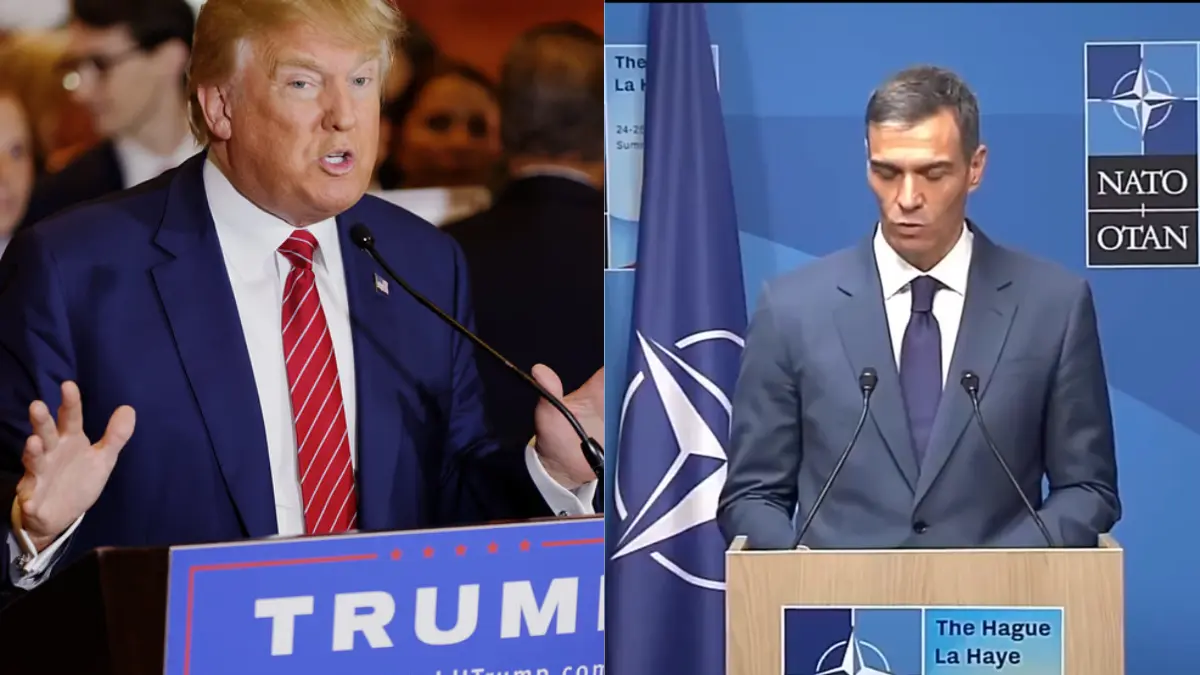President Sets 5% Defense Budget Target as Alliance Faces Unity Challenges.
WASHINGTON – President Donald Trump on Wednesday criticized Spain for failing to meet NATO defense spending obligations, threatening trade consequences and demanding the country commit to spending 5% of its national budget on defense—more than double the current NATO target.
During a press conference, Trump singled out Spain as “the only country that refuses to pay their fair share,” expressing frustration that the nation wants to maintain the existing 2% spending goal. At the same time, other allies work toward higher targets.
Get the complete coverage here – Trump warns Spain: Pay up for defense or pay ‘twice as much’ in trade negotiations
Trump Proposes Trade Agreement as Leverage
“I think it’s unacceptable. Their economy is doing quite well,” Trump said, announcing that the U.S. is developing a trade agreement requiring Spain to “pay double what they currently do.”
The president indicated he would engage in direct negotiations with Spanish leadership to secure an agreement on the 5% defense spending limit, framing the issue as a matter of fairness within the alliance.
“They’re looking for some advantages without fully taking responsibility, but I believe they should make up for it through trade because it’s not right to let that slide,” Trump stated.
Spain Requests Exemption from Higher Spending Goals
Spanish Prime Minister Pedro Sánchez has requested an exemption from new spending agreements, citing his country’s ongoing struggles to meet even the current 2% NATO target. The request came as NATO negotiations concluded on establishing new defense spending benchmarks.
Spain’s resistance has drawn criticism from other alliance members, with one European official warning that the country is “putting NATO’s long-standing unity at risk, which has been in place since 1949.”
European Concerns Over Alliance Cohesion
The unnamed European official emphasized the principle of collective responsibility within NATO, noting Spain’s history of receiving alliance support during times of crisis.
“This isn’t a situation where countries can pick and choose what they want to support. Spain often asks for help during tough times, like the 2008 financial crisis and the COVID pandemic, and it has received that support,” the official said.
U.S. leaders have reportedly been encouraging other European nations to apply pressure on the spending issue, seeking to avoid the intense confrontations that characterized Trump’s previous presidency.
NATO Sets Ambitious New Spending Targets
NATO leaders have committed to significant increases in defense budgets over the next decade, establishing targets of 3.5% for core defense needs and 1.5% for related areas, including cybersecurity and intelligence.
While Slovakia initially expressed concerns about the new spending goals, the country ultimately chose not to block the agreement.
French President Warns Against Trade War Tactics
French President Emmanuel Macron voiced opposition to combining defense spending demands with trade threats, arguing the approach undermines alliance cooperation.
“As allies, we shouldn’t be telling each other to spend more money while also engaging in trade wars; it just doesn’t make sense,” Macron stated.
NATO Leadership Emphasizes Security Imperatives
NATO Secretary General Jens Stoltenberg defended the spending increases, stating that all member countries recognize current security threats and agree on the necessity of enhanced defense capabilities.
The push for increased military spending reflects broader concerns about regional security, particularly regarding Russia’s invasion of Ukraine and President Vladimir Putin’s actions.
Background: Article 5 Commitments and Alliance Stability
The spending dispute occurs against the backdrop of questions about the U.S. commitment to NATO’s Article 5 mutual defense provision. Trump previously suggested American support might be conditional on European defense contributions, raising concerns about alliance solidarity.
When questioned on Wednesday about his position on Article 5, Trump affirmed his support: “I support it. That’s the reason I’m here. If I didn’t support it, I wouldn’t be here.”
The uncertainty surrounding U.S. commitments has contributed to European efforts to strengthen independent defense capabilities while maintaining transatlantic alliance structures.
Spain’s position as a holdout on increased spending comes as the country has taken steps to boost its defense budget in response to the evolving security environment following Russia’s invasion of Ukraine.
Read more –
Trump Announces Israel-Iran Ceasefire After 12-Day Conflict.
